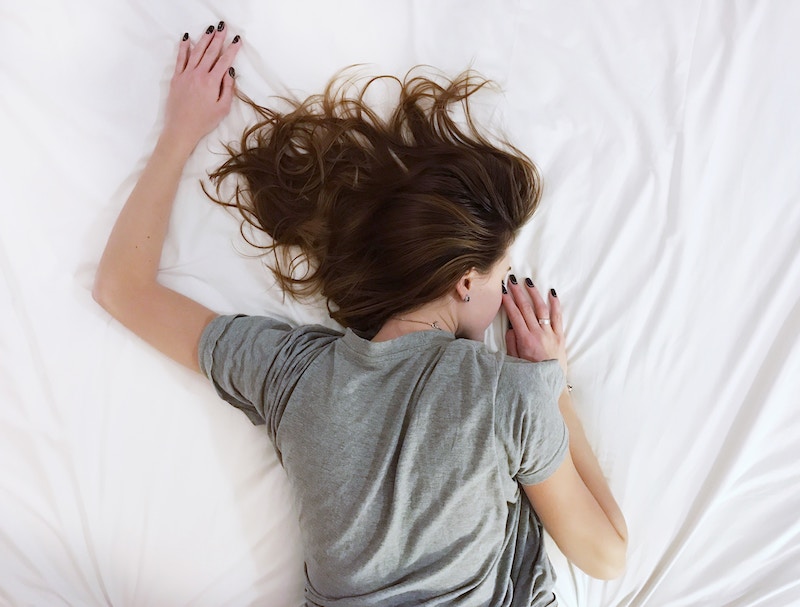PCOS and Sleep: Everything You Need to Know!

Getting proper sleep is essential for maintaining good health. At an average, you need 7 to 9 hours of sleep per day. However, sleeping for 9 hours at a stretch is not as important as maintaining a proper sleep cycle. Even if you are getting 10 hours of sleep in a day, but don’t have a proper sleep cycle, it will have adverse effects on your health.
A disturbed sleep cycle can result in hunger, inability to function and even irritability. If you suffer from PCOS and have sleep related issues, it is important to understand how this affects you. In today’s article I would like to discuss sleep apnea and insomnia, two conditions, that quite a number of women with PCOS struggle with. We’ll also look at ways to help you maintain or build a healthy sleep cycle.
PCOS and Sleep Apnea
So what is sleep apnea anyways? Generally speaking women who suffer from this condition have abnormal breathing while they sleep. They either breathe repeatedly and at times, they stop breathing for a while after resuming. Common symptoms associated with sleep apnea include:
- Sleepiness and fatigue throughout the day even if you sleep for 7 to 9 hours
- Severe dry mouth when you wake up
- Sore throat after waking up
- Morning headache
- Situations where you stop breathing entirely
Many women with PCOS experience some kind of “PCOS fatigue”, because of the restless sleep caused by abnormal breathing. Sleep is a way for your body to relax. But when your breathing is abnormal, your body is unable to do so. In fact, it has to work even harder when you breathe too much or too little while sleeping. If you have PCOS and struggle with irregular breathing during your sleep, it is best to see a doctor, as sleep apnea could be making your PCOS symptoms worse.
How to Treat Sleep Apnea
Depending on the severity of your condition, the doctor may prescribe various treatments. If the condition is mild, the doctor may simply advise you to establish good sleeping habits. However, in some cases, the doctor may advise you to use a mouth guard. The mouth guard keeps your throat open and helps you breathe while you sleep.
If you suffer from a severe case of sleep apnea, the doctor may advise the use of a Continuous Positive Airway Pressure (CPAP) machine. This machine has a mask that you can place over your nose and mouth. The machine generates pressure to keep your throat and airways open and assist breathing.
Bear in mind that using the CPAP machine can be uncomfortable. Sleeping with the mask on takes getting used to. Under no circumstances should you take this condition lightly. If you do not seek treatment in time, sleep apnea can be a life threatening condition.
Other Issues That Result in Sleep Apnea
If you gained excess weight due to PCOS, you may be suffering from sleep apnea. The excessive fat and tissue around your throat can cause obstruction in breathing. Therefore, you may want to consider changing your routine and adapting to healthier eating habits. Losing weight with PCOS is no easy endeavour, but I promise: Your efforts will pay off! Once you lose weight, you may see a significant improvement in your sleep and most probably also to other PCOS symptoms.
PCOS and Insomnia
Insomnia is a condition, that makes it hard for you to fall asleep. If you ignore the condition, it can develop into a serious issue as sleep is vital to your well-being. Some women with PCOS suffer from occasional insomnia, particularly during the luteal phase of menstrual cycles. Others suffer from a chronic insomnia. Yes, PCOS can lead to lack of sleep, but there are many other potential causes of insomnia.
- Elevated stress levels
- Lack of proper exercise
- Lack of proper diet
- Hormonal imbalance
- Certain medication or drugs also cause insomnia
As you can tell some of the conditions mentioned above are caused or reinforced by PCOS. Even if you suffer from occasional insomnia, you should speak to your doctor about it, as lack of sleep can affect your overall (mental) health and well-being.
Treatment for Insomnia
The treatment for insomnia depends entirely on the cause. If you suffer from insomnia due to hormonal imbalance due to PCOS, your doctor may prescribe medication. Hormonal birth control medication often helps with PCOS sleep deprivation. It helps regulate your hormones during menstrual cycles and prevents hormone related insomnia.
There are also insomnia medications that you can use to get proper sleep. However, you should discuss the risks associated with these medicines with your doctor. While these medicines do help you get proper sleep, they can be addictive in the long run.
How to Improve Your Sleep Pattern Naturally
There are many ways to improve your sleep pattern naturally. These methods will not only help you get proper sleep but they will also help in curbing the symptoms of PCOS.
1. Avoid Taking Naps
Taking naps during the day can disturb your sleep pattern as it is. If you are already suffering from insomnia, it will become even more difficult for you to fall asleep at night.Therefore, the best thing to do is hold off on your sleep until bedtime.
2. Eating Before Going to Bed
There is no doubt that you should not eat at night. However, it is not a good idea to go to sleep on an empty stomach. A light and healthy snack before going to bed will help you sleep better.
3. Get Rid Of Electronics
You should put all electronics away an hour before going to bed. If you have the habit of using your phone before going to bed, you may probably have trouble sleeping. The light from the screen stimulates the brain and keeps you up. A better option is to read a book right before going to bed.
4. Exercise in the Evening
Tiring yourself out before going to sleep is the best way to counter insomnia. Therefore, it is best to exercise in the evening, preferably a few hours before going to bed. Doing so will tire you out and help you sleep. Exercising regularly will also help your PCOS symptoms as well.
5. Sleeping Position Matters
Many women sleep on their stomach. This sleeping position can have adverse effects on your spine and result in sleeping disorders. Some argue, that the best sleeping position for PCOS is on your back. It will help your sleep and help curb backaches. Investing in a memory foam mattress can also help your sleep pattern and quality significantly.
PCOS or Not: Sleep Matters!
We often don’t think much about the quality of our sleep, but rest assured: No matter whether you have PCOS or not, improving you sleep will improve your health. If you are on a weight loss journey, an irregular sleeping schedule or pattern could be one of the reasons you’re not losing weight. If you have PCOS, a lack of sleep or “PCOS fatigue” could make your symptoms worse. Sleep is essential for your health, so if you suffer from sleep apnea, insomnia or have other sleep related problems, you should seek help immediately.

